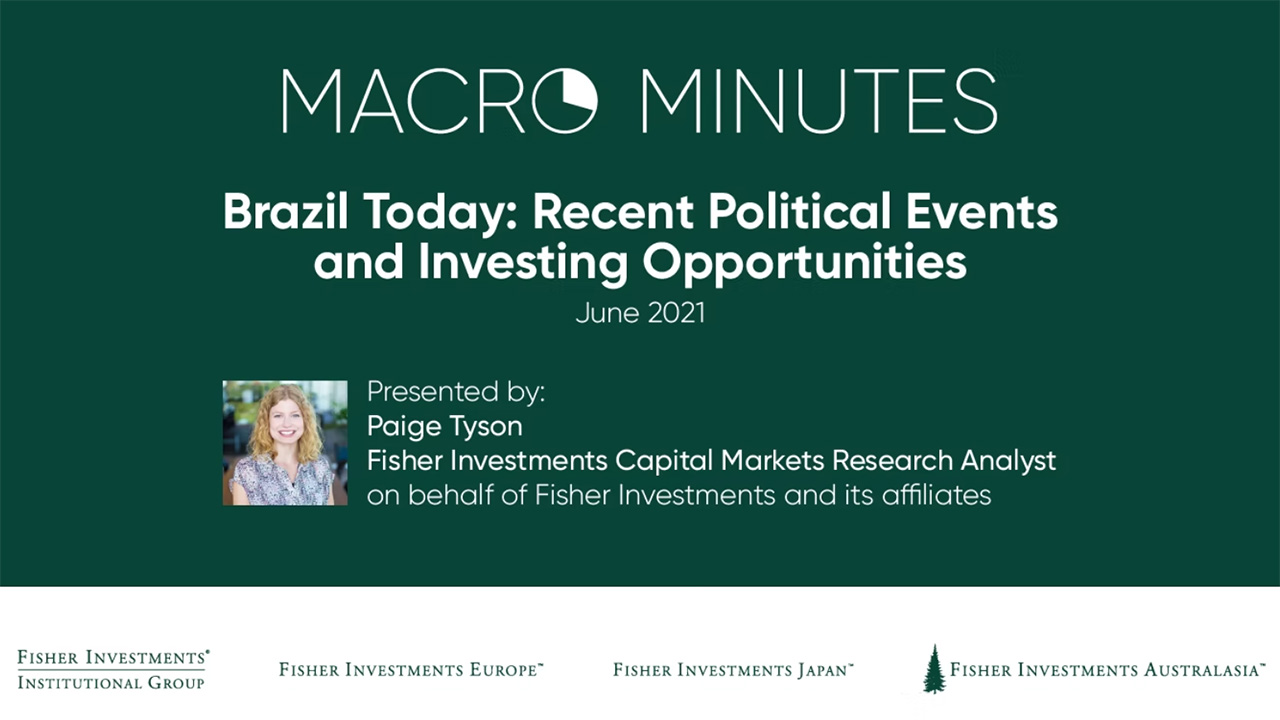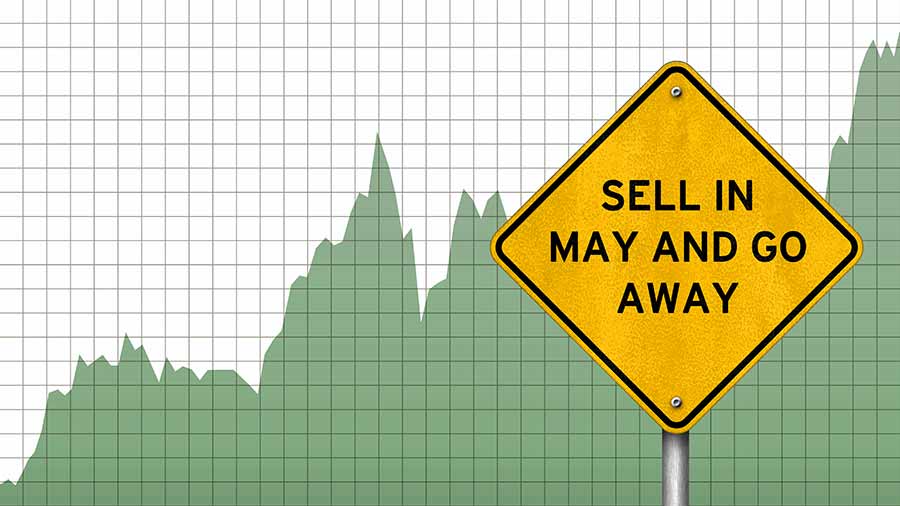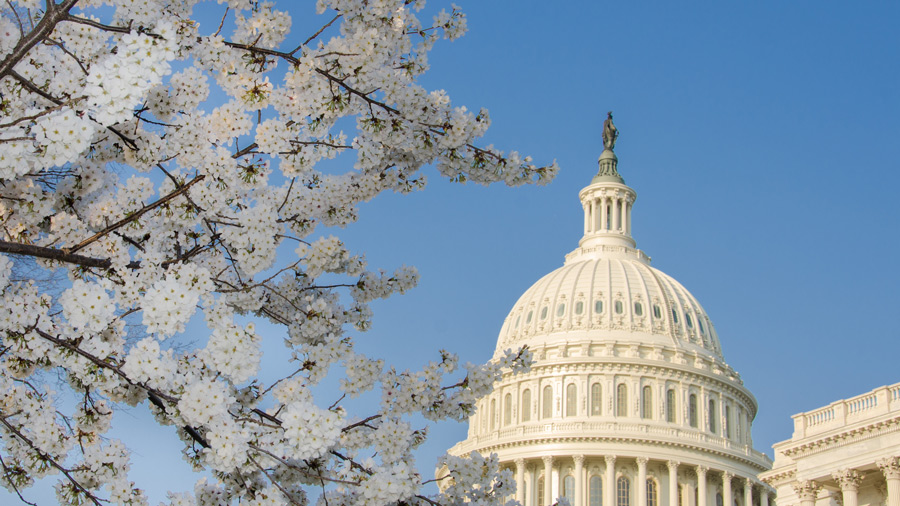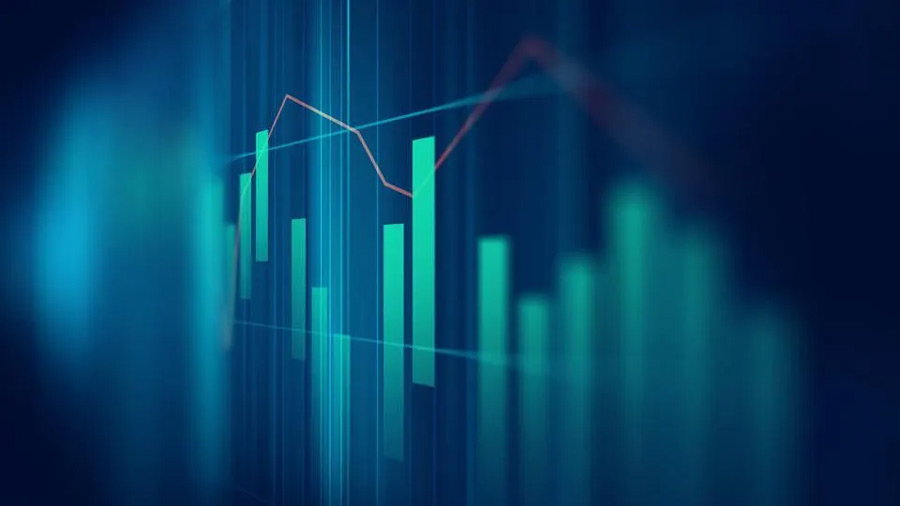Institutional Investing / Macro Minutes
Macro Minutes: Brazil Today Recent Political Events and Investing Opportunities

In June’s Macro Minutes video, Capital Markets Research Analyst Paige Tyson shares Fisher Investments’ views of Brazil.
In June’s Macro Minutes video, Capital Markets Research Analyst Paige Tyson shares Fisher Investments’ views of Brazil.
Transcript
Title screen appears “Brazil Today: Recent Political Events and Investing Opportunities”
Underneath the title is the picture of the presenter Paige Tyson, Fisher Investment Capital Markets Research Analyst.
On behalf of Fisher Investments and its affiliates.
On the bottom right of the screen is a live Paige Tyson speaking to us from her office.
Paige Tyson: Hi, my name is Paige Tyson, and I'm a capital markets research analyst. Today I'll be covering some of our views of Brazil.
We'll talk about the composition of Brazil's stock market and the key investment opportunities we see before diving into our view on how recent political events are shaping our view of the country.
On the screen, Paige Tyson is showing a chart with the heading, “Brazil Composition is Changing Slowly”. The sub-heading reads “Brazil has heavy exposure to resources and financials, with increasing opportunities in growth-oriented industries”.
The chart is showing the growth of Brazil in between 2010 and 2020 covering many fields such as Financials, Materials, Energy, Consumer Staples, Consumer Discretionary, Industrials, Utilities, Health Care, Communication Services, Real Estate and Information Technology.
Paige Tyson: We'll start with a look at the composition of Brazil. Often underappreciated is the changing composition of Brazil's market and the growing opportunities outside of the more traditional resource focused sectors.
Paige Tyson: The bulk of Brazil's exposure is still in resource and commodity heavy areas of the market, like energy and materials, albeit taking up less of the index versus ten years ago, much like the trend happening across the world.
Paige Tyson: The financial sector has also grown significantly on the back of high interest rates, higher credit spreads and increasing volumes as more Brazilians get access to the banking sector. We're also always seeking additional opportunities, and over the last few years, we've seen the emergence of more growth-oriented areas in Brazil's market, particularly ecommerce within the consumer discretionary sector.
On the screen, Paige Tyson is showing another chart with the heading, “Brazil Acts Like Value”. This chart is showing how Brazil outperformed the emerging markets in all Korea, and Taiwan, year over year, from 2010 to 2021 with an 80% lead over its peers.
Paige Tyson: Digging into what that means for portfolio positioning, that heavy exposure to resources and financials means Brazil's stock market provides good value and commodities exposure. This positioning has benefited the country as resource prices have climbed in 2021. Across our strategies, we currently have a unique view that markets are acting late cycle and expect economic growth to moderate, which leads us to prefer more growth-oriented areas of the market. But we also want to incorporate some risk control in the form of value exposure, and having exposure to Brazil provides a good value hedge.
Paige Tyson: You can see here that Brazil tends to outperform with value in the emerging markets universe, along with broader value indices such as the Russell 3000.
This positioning has benefited our EM portfolios as more value-oriented areas of the market outperformed in late 2020 and early 2021, tied to increasing optimism about the vaccine rollout and rising economic activity.
On the screen, Paige Tyson is showing another chart with the heading “Brazil Internet & E-Commerce Opportunities”. On the chart, Brazil is ranked 2nd by internet access across the globe, and ranked 4th by preparedness to support online shopping.
Paige Tyson: Like I mentioned, growth-oriented opportunities exist in Brazil in the realm of e-commerce, with players like Magazine Louisa. We think this is an underappreciated and underpenetrated area of growth in the region.
Paige Tyson: Online shopping around the world has steadily increased over the past several years, notably among middle- and high-income swaths of the population. Throughout emerging markets, as the middle class grows, we would expect that to translate into a higher proportion of online shoppers.
Paige Tyson: As you can see here, Brazil already has a relatively high level of Internet penetration and is particularly well situated to capitalize on e-commerce growth. We saw a large increase in adoption in 2020 tied to social distancing measures, and that's proven to be pretty sticky.
On the operational side, support for online shopping is improving quickly as online distributors continue building out infrastructure to serve harder to reach areas of the country, such as adding additional warehouses and distribution centres or improving transportation logistics. As a result, the penetration of online shopping should also increase with increased capacity. There's a long runway for e-commerce to grow.
On the screen, Paige Tyson is showing another chart with the heading, “Brazil Politics – Looking Beyond the Noise”. The chart shows the timeline of President Bolsonaro’s time in office, this timeline is showing the important events and decisions following President Bolsonaro’s take-over of the office.
Paige Tyson: We can't talk about Brazil without talking about politics. The dramatic political backdrop often overshadows the fundamental reality of Brazil, which is why we focus on looking beyond the noise and take a more objective view.
Paige Tyson: Let's walk through our thinking. When Bolsonaro took office in 2019, there was a lot of optimism about an improving political environment with a pro-reform and pro-growth agenda. That agenda was moderately successful in the early days with the passage of a large pension reform package, but then almost immediately gave way to containing the COVID-19 crisis.
But even if COVID hadn't derailed the reform agenda, it likely would have surprised the downside anyway. There's a phenomenon in emerging markets we call the “Honeymoon Effect”, where a pro-business, pro-reform president takes office and markets rally on the hope that they'll turn around the economy and stimulate growth.
This sentiment boost typically fails about eight to twelve months into the leader's tenure, as execution on those campaign promises becomes untenable, whether that's due to a fractured Congress, long standing political headwinds, a poor macro environment, or anything else that might cause their stance to soften.
Paige Tyson: This time, the Honeymoon Effect in Brazil was exacerbated by COVID-19 but didn't surprise us. Nor was it the basis of our thesis to own Brazilian names. There's been additional political turmoil in Brazil outside of COVID-19, like accusations of corruption against Bolsonaro and threats of impeachment. These so far haven't gained traction and are well priced into the market. Also, while it's important to look at the political risks in a country like Brazil, investors shouldn't forget that political uncertainty is ever present in Latin America. There have been five presidents since Brazil formed a new constitution in 1987 that instituted elections by popular vote, and two of those presidents were impeached on corruption charges. And while markets were volatile leading up to that impeachment, in both cases, Brazil underperformed during the impeachment proceedings, but outperformed emerging markets three, six and 18 months later as uncertainty fell. There are also fears that the annulment of former President Lula's corruption charges makes him a credible challenger to Bolsonaro in the 2022 elections and stokes fears Bolsonaro would abandon reform efforts in favor of popularity boosting social issues. These reform efforts were already pushed to the side due to COVID, and those fears have proven overblown as Bolsonaro's government has kept prioritizing the maintenance of the spending cap and is pushing on tax reform. We don't think now is the time for investors to worry about the 2022 presidential election, as there are simply too many unknowns and potential outcomes in the next 16 months. A focus on fundamentals is more prudent at this point. A better-than-expected economic recovery and continued vaccine rollout should continue benefiting the country over the next twelve to 18 months.
On the screen, Paige Tyson is showing a chart with the heading, “Brazil Is Recovering And Beating Expectations”. It shows 2 charts of Brazil’s GDP recovery expectations, and retail sales, this data is for the last 2 years, from the visual alone, it is clear that Brazil recovery was fast and unexpected, beating all expectations.
Paige Tyson: You can see that better-than-expected economic recovery in the data retail sales and industrial production have bounced back from pre-COVID lows and continue recovering ahead of expectations. As restrictions continue easing and more of the population receives vaccinations, we expect this positive trend to continue.
Additionally, as Brazil continues recovering, overly dower analysts have been revising their expectations upward, better aligning with our view that Brazil is well poised to capitalize on the global economic recovery and expansion.
Paige Tyson: We remain confident that investing in Brazil's value-oriented areas of the market will continue to provide a good value hedge in portfolios, and we're optimistic about the growth prospects of investing in e-commerce.
On the screen, a white background appears with black written text that read as “thank you for watching! If you would like to learn more about our view, please reach out to your relationship manager or email FisherInstitutional@fi.com. A series of disclosures appears on the screen:” Fisher Asset Management, LLC does Business as Fisher Investments, investing in stock markets involve the risk of loss and there is no guarantee that all or any capital invested will be repaid. Past performance is not guarantee of future results. This commentary constitutes the general views of Fisher Investments and should not be regarded as personalized investment or tax advice or as a representation of their performance or that of their clients. No assurances are made that they will continue to hold their views, which may change at any time based on new information, analysis or reconsideration. In addition, no assurances are made regarding the accuracy of any forecast made herein. Not all past forecasts have been, nor future forecasts will be, as accurate as any contained herein.
Paige Tyson: Thank you for watching. If you would like to learn more about our views, please reach out to your relationship manager.
[Music]
See Our Institutional Insights
Stay on top of the latest investment trends and developments with our views and research.







